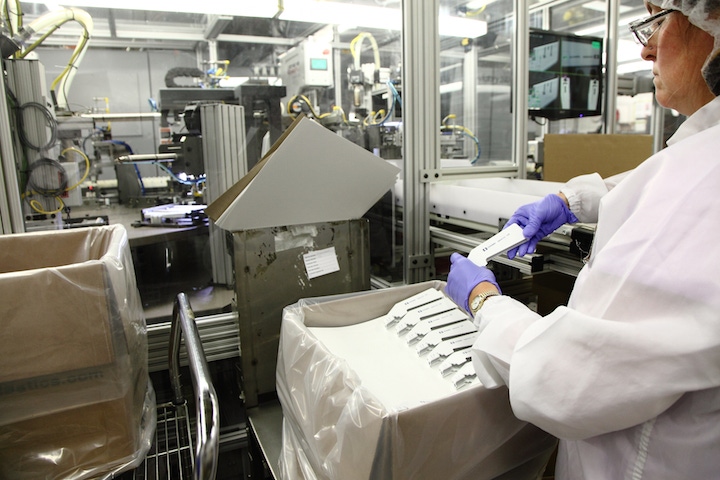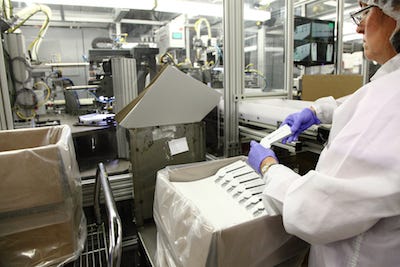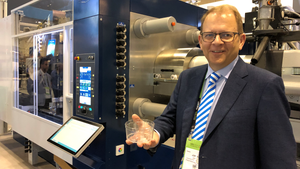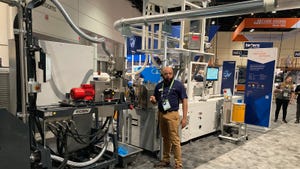Making it in medical molding, part two
In part one of this two-part article, plastics processors with deep ties to medical device OEMs explained the importance of having in-house engineering expertise if you're serious about doing business with the medtech sector. In part two, experts from Prism Plastics, Phillips-Medisize, GW Plastics and Nypro discuss certification issues, the value (or not) of having a global footprint and why you need to show commitment.The question of certification
October 15, 2015

In part one of this two-part article, plastics processors with deep ties to medical device OEMs explained the importance of having in-house engineering expertise if you're serious about doing business with the medtech sector. In part two, experts from Prism Plastics, Phillips-Medisize, GW Plastics and Nypro discuss certification issues, the value (or not) of having a global footprint and why you need to show commitment.
The question of certification
There are some medical molders who make a virtue of not having ISO certification. It adds cost and complexity to the process, an administrative burden that is not entirely justified, they say. Most medical molders beg to differ, however.
|
Image courtesy GW Plastics. |
"The level of quality required depends on the application and the level of risk," says Bill Welch, Chief Technology Officer at Phillips-Medisize (Hudson, WI). "Medical tubing may have a much lower risk than a complete plastic device that is made up of 14 or 15 parts and may even contain some metal inserts. But, generally speaking, without the appropriate certification, you are limiting your potential customer base. It's on their checklist—ISO 13485 is always required by our customers," says Welch.
Adds Timothy Reis, Vice President, Healthcare Business Development, at GW Plastics (Bethel, VT): "ISO 13485 is the biggest precursor for entering the medical molding market. The standard dictates a consistent, methodical approach. I don't see how you can expect to be taken seriously without it."
Although Prism Plastics (Chesterfield, MI) is certified to ISO 13485, it proudly proclaims that it does not have a quality department. "Our company philosophy is that everyone on our staff is in the quality department," says Gerry Phillips, Vice President and co-founder. "Responsibility and accountability for quality is shared by everyone. By the time you get to parts inspection, it's too late."
The global footprint
The medical technology sector is a global industry, and for contract molders with global ambitions, regionalization and proximity to customers is key. Phillips-Medisize, for example, which operates plants in China, Europe, the United States and Mexico, says it's all about leaving options open for OEMs. "In China, the 80/20 rule applies," says Welch, meaning that 80% of what is made there stays there for local consumption. "We have facilities in Western Europe, but also in the Czech Republic, as a low-cost option for the EU market. Likewise, we have facilities in Wisconsin, as well as Mexico. It's all about having low-cost options within the same geography."
A global presence may be necessary if the customer has design centers in offshore locations, says John Witkowski, General Manager at Nypro (Clinton, MA). "It's important in the front-end development process, because you want to be nearby to facilitate communication. But it's not as critical in the full production stage," adds Witkowski, "given the supply chain logistics that are available today."
Witkowski does offer some sage advice when it comes to considering a global presence: Know what you don't know and act accordingly. "It's easy to stub your toes on local business customs, hiring practices and trying to do high-tech work in a location that doesn't have the workforce to support it. My advice is to hire a consulting group that knows that market so you don't make huge mistakes or act on inappropriate assumptions."
Offshoring is not in the Plastic Molding Manufacturing (Hudson, MA) playbook. In fact, the company is dedicated to bringing manufacturing back to the United States. It has an ally in the medical manufacturing industry . . . mostly. "Medical companies typically do not outsource outside of the United States," says CEO George E. Danis. "Our objective is to reshore manufacturing to the United States, not just molding, but all manufacturing." And that goal is within reach, adds Danis. "The United States is competitive in quality, delivery times and even in cost, as labor in China is becoming more expensive."
Committing to a (business) relationship
Demonstrating a commitment to the device industry is an essential element in carving out a future as a medical molder. Phillips of Prism Plastics has some unique insights on this.
A successful supplier of injection molding services to the automotive sector, Prism established Prism Medical in 2010. Five years on, the results have been disappointing. Part of the problem, says Phillips, is a perception, not unfounded, that providers of molding services to the automotive sector often hunt for business in the medical sector when carmakers go through one of their cyclical downturns, only to put diversification on the back burner once the auto industry picks up again. "That worked against us," says Phillips. The company has taken a new tack and plans to acquire a medical molder to show its determination to enter this market and its willingness to be there for the long haul.
"Long-term commitment is crucial because of the time it takes to develop a product," explains Phillips. "It would be disastrous if a company were to drop the ball at some point during the process."
Medical manufacturing is a much more collaborative process than automotive, adds Phillips. "Teams are formed early in the process and work through problems together. OEMs want input on processes, material selection and so forth.
Communication is more frequent and more systematic," says Phillips. "Rules for qualifying parts and milestones are well defined. If you are going to miss a milestone, there is a collaborative process to talk it through and solve the problem. It is relationship based," stresses Phillips.
At the end of the day, making a business relationship work is not that different from any other relationship—you need to show commitment.
Read part one of Making it in medical molding.
About the Author(s)
You May Also Like




